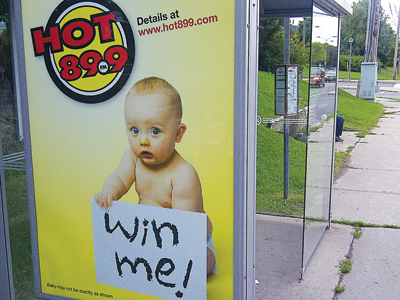 The big radio companies are massively dittoing a proposal from Entercom that would relax Federal Communications Commission requirements that radio stations announce the “material” rules of a radio contest over the airwaves.
The big radio companies are massively dittoing a proposal from Entercom that would relax Federal Communications Commission requirements that radio stations announce the “material” rules of a radio contest over the airwaves.
“In today’s fast paced world, Americans expect to instantly access information at their fingertips by merely logging on to a website, conducting a Google search, or using an app on their smart phone,” Entercom’s petition argues. “Relying on broadcast announcements for material contest information may have been an acceptable way to attempt to inform the public about the terms of a contest when the Contest Rule was enacted in 1976, but it is certainly not the case today, especially when there are superior methods that are simple to implement.”
At present, the FCC’s “contest rule” says that the “material terms” of the game must be explained “periodically by announcements broadcast on the station conducting the contest.” This doesn’t mean that the station has to explain the rules in their entirety every time, but “disclosure of material terms in a reasonable number of announcements is sufficient.”
The gist of Entercom’s proposal is to let stations announce the contest over the airwaves, but point listeners to the station website for more details. As Entercom puts it:
“Entercom proposes that the Commission amend the Contest Rule to permit broadcasters to either: (a) broadcast the material terms on the station (as provided in the current rule); or (b) provide in written form on a website and upon request by email, facsimile, mail or in person, provided that the station makes periodic announcements advertising how and where the public can gain access to the material terms of a contest.”
This is a great idea, says Clear Channel. “Entercom’s Petition observes what cannot seriously be disputed: Americans today live in an age of instantaneously accessible information,” the company writes. “It makes little sense, therefore, for the Commission to retain a Contest Rule that specifies on-air announcements as the only permissible method of informing the public about the material terms of station contests.”
Actually, that last sentence is inaccurate. The “Contest Rule” does allow for disclosure of rules in “a non broadcast manner”—they just have to be announced on air as well. But one can understand Clear Channel being a bit prickly about this issue. The company has a history of being punished by the FCC for botched contests.
My favorite is a 1999 case in which a Clear Channel frequency in El Paso told listeners that if they called in and got ten questions right, they would win “10,000.” After one person did just that, the station’s general manager informed her that the cash amount referred to Italian lira, not dollars. The winner received a check for 53 bucks, the then-USD equivalent.
How did Clear Channel respond to the inevitable consumer complaint? The radio giant told the FCC that this was ok because “the station never stated ‘on the air’ that it was giving away ten thousand dollars,” the Commission’s summary for that incident explained. “Rules for the contest, which stated that the prize was 10,000 Italian lira, were posted on Clear Channel’s web site.” This didn’t fly with the FCC, given the “material” clause of the contest rule.
That was then. Now even NPR is cheering for this deregulatory proposal:
“By their very nature, periodic broadcast announcements are not as effective as online, written disclosures. For a broadcast contest announcement to be effective, the listener must be present throughout the entire announcement to hear all of the material terms. In addition, on-air announcements are not continuously available to listeners. As a result, many listeners simply may not hear the announcement, and will therefore not be informed of contest rules. By contrast, content rules made available online are accessible 24 hours a day. In addition, local public radio stations have cultivated strong online presences, and their audiences have become accustomed to visiting the station’s website or social media platforms to obtain program and other information. Making the contest rules available online conforms to contemporary public radio audience habits, rendering the disclosures more effective.”
Since none of the filers seem to be opposed to Entercom’s plan, I’ll chime in with some concerns. The new scheme could facilitate bait and switch campaigns in which the point of an on air game announcement is to drive listeners to a web site, where they learn that the real contest isn’t nearly as fun as it sounded (see the lira scheme above). This will now be legal; nonetheless the damage will have been done. The mark will be on the web page as intended—up to her eyeballs in ads and third party data harvesting apps.
Nothing is stopping these stations from putting their game rules on a web page now, but there’s something to be said for clearly explaining them on the air as well, so consumers know what they’re in for before they fire up their iOS or Android browser. Of course, explaining a complex contest takes broadcasting skill. What a shame then that Clear Channel is firing its on air talent faster than you can say Charles Van Doren.


